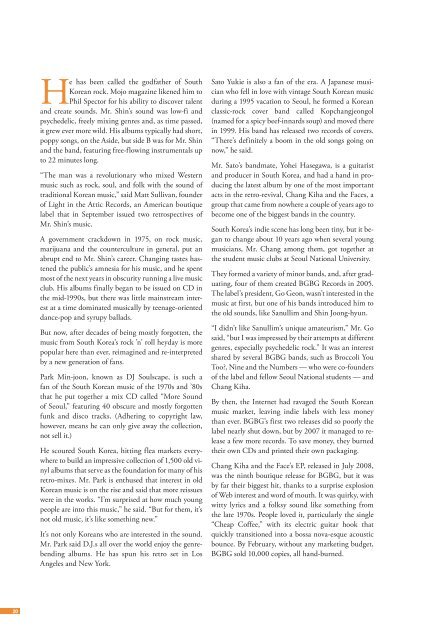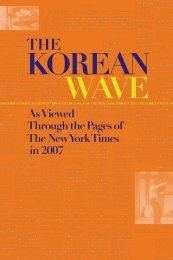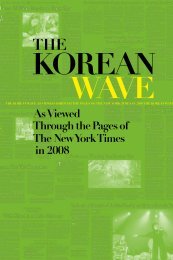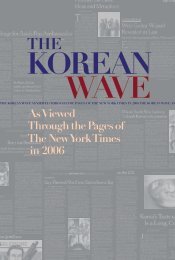The Korean Wave 2010-2011 - Korean Cultural Service
The Korean Wave 2010-2011 - Korean Cultural Service
The Korean Wave 2010-2011 - Korean Cultural Service
Create successful ePaper yourself
Turn your PDF publications into a flip-book with our unique Google optimized e-Paper software.
He has been called the godfather of South<strong>Korean</strong> rock. Mojo magazine likened him toPhil Spector for his ability to discover talentand create sounds. Mr. Shin’s sound was low-fi andpsychedelic, freely mixing genres and, as time passed,it grew ever more wild. His albums typically had short,poppy songs, on the Aside, but side B was for Mr. Shinand the band, featuring free-flowing instrumentals upto 22 minutes long.“<strong>The</strong> man was a revolutionary who mixed Westernmusic such as rock, soul, and folk with the sound oftraditional <strong>Korean</strong> music,” said Matt Sullivan, founderof Light in the Attic Records, an American boutiquelabel that in September issued two retrospectives ofMr. Shin’s music.A government crackdown in 1975, on rock music,marijuana and the counterculture in general, put anabrupt end to Mr. Shin’s career. Changing tastes hastenedthe public’s amnesia for his music, and he spentmost of the next years in obscurity running a live musicclub. His albums finally began to be issued on CD inthe mid-1990s, but there was little mainstream interestat a time dominated musically by teenage-orienteddance-pop and syrupy ballads.But now, after decades of being mostly forgotten, themusic from South Korea’s rock ’n’ roll heyday is morepopular here than ever, reimagined and re-interpretedby a new generation of fans.Park Min-joon, known as DJ Soulscape, is such afan of the South <strong>Korean</strong> music of the 1970s and ’80sthat he put together a mix CD called “More Soundof Seoul,” featuring 40 obscure and mostly forgottenfunk and disco tracks. (Adhering to copyright law,however, means he can only give away the collection,not sell it.)He scoured South Korea, hitting flea markets everywhereto build an impressive collection of 1,500 old vinylalbums that serve as the foundation for many of hisretro-mixes. Mr. Park is enthused that interest in old<strong>Korean</strong> music is on the rise and said that more reissueswere in the works. “I’m surprised at how much youngpeople are into this music,” he said. “But for them, it’snot old music, it’s like something new.”It’s not only <strong>Korean</strong>s who are interested in the sound.Mr. Park said D.J.s all over the world enjoy the genrebendingalbums. He has spun his retro set in LosAngeles and New York.Sato Yukie is also a fan of the era. A Japanese musicianwho fell in love with vintage South <strong>Korean</strong> musicduring a 1995 vacation to Seoul, he formed a <strong>Korean</strong>classic-rock cover band called Kopchangjeongol(named for a spicy beef-innards soup) and moved therein 1999. His band has released two records of covers.“<strong>The</strong>re’s definitely a boom in the old songs going onnow,” he said.Mr. Sato’s bandmate, Yohei Hasegawa, is a guitaristand producer in South Korea, and had a hand in producingthe latest album by one of the most importantacts in the retro-revival, Chang Kiha and the Faces, agroup that came from nowhere a couple of years ago tobecome one of the biggest bands in the country.South Korea’s indie scene has long been tiny, but it beganto change about 10 years ago when several youngmusicians, Mr. Chang among them, got together atthe student music clubs at Seoul National University.<strong>The</strong>y formed a variety of minor bands, and, after graduating,four of them created BGBG Records in 2005.<strong>The</strong> label’s president, Go Geon, wasn’t interested in themusic at first, but one of his bands introduced him tothe old sounds, like Sanullim and Shin Joong-hyun.“I didn’t like Sanullim’s unique amateurism,” Mr. Gosaid, “but I was impressed by their attempts at differentgenres, especially psychedelic rock.” It was an interestshared by several BGBG bands, such as Broccoli YouToo?, Nine and the Numbers — who were co-foundersof the label and fellow Seoul National students — andChang Kiha.By then, the Internet had ravaged the South <strong>Korean</strong>music market, leaving indie labels with less moneythan ever. BGBG’s first two releases did so poorly thelabel nearly shut down, but by 2007 it managed to releasea few more records. To save money, they burnedtheir own CDs and printed their own packaging.Chang Kiha and the Face’s EP, released in July 2008,was the ninth boutique release for BGBG, but it wasby far their biggest hit, thanks to a surprise explosionof Web interest and word of mouth. It was quirky, withwitty lyrics and a folksy sound like something fromthe late 1970s. People loved it, particularly the single“Cheap Coffee,” with its electric guitar hook thatquickly transitioned into a bossa nova-esque acousticbounce. By February, without any marketing budget,BGBG sold 10,000 copies, all hand-burned.Chang Kiha’s first full-length album, “Livinga Nothing Special Life,” sold 52,000 copies— big numbers for an indie release in SouthKorea these days — and his second full-length album,released in July, is getting his best reviews yet.“Chang’s combination of intelligent lyrics and a freshsound oozes authenticity,” said Bernie Cho, the presidentof DFSB Kollective, a digital music distributor.“Plus he put together two of the best videos of the year.Low budget, but very clever.”<strong>The</strong>n there are bands like Jambinai, which uses a mixof traditional instruments and f/x pedals to create asound that is ancient but totally modern.<strong>The</strong> Internet also helped Shin Joong-hyun find newaudiences. Mr. Sullivan of Light in the Attic Recordsdiscovered Mr. Shin when a friend sent him a Youtubelink of Kim Jung-mi playing her hauntingly beautifulsong “<strong>The</strong> Sun.” “To say I was immediately mesmerizedwould be a massive understatement,” Mr. Sullivan said.It was not easy to pull together the collection. Manyof Mr. Shin’s master recordings had been lost over theyears, even, rumor has it, deliberately destroyed by thegovernment in its sweeping 1975 crackdown. Most ofthe CD re-issues of Mr. Shin’s old catalog were donepoorly, even at the wrong speed. So Mr. Sullivan madenew transfers off old LPs, trying to bring Mr. Shin’smusic to life. Another American label, Lion Records,has two more releases coming this year.“At first, I couldn’t believe it when an American labelapproached me, but then we started working togetherand we built our trust,” Mr. Shin said. “I don’t knowmuch about these new bands, but I’m happy to think Imight be making an influence still.”This article has been revised to reflect the following correction:Correction: October 24, <strong>2011</strong>A previous version of this article gave an incorrect name forthe man known as DJ Soulscape. His name is Park Min-joon,not Kim Min-joon. A photograph accompanying the articlewas erroneously credited to NAK. <strong>The</strong> correct credit is Aston‘‘Husumu’’ Hwang.20 Copyright © <strong>2011</strong> by <strong>The</strong> New York Times Co. Reprinted with permission. 21





